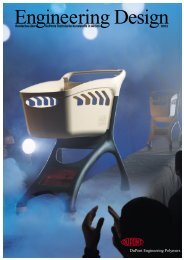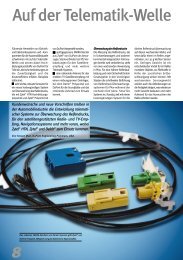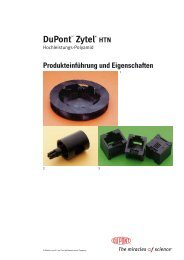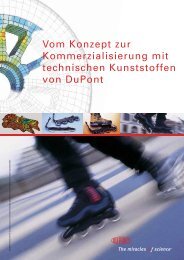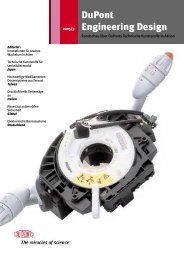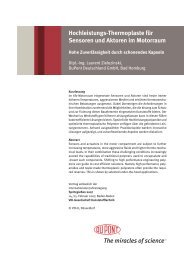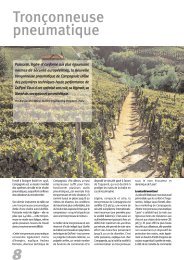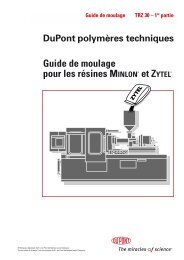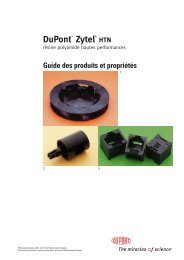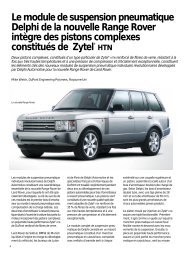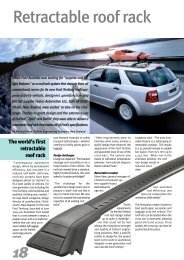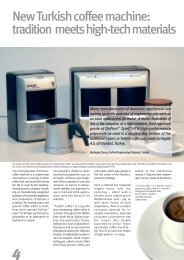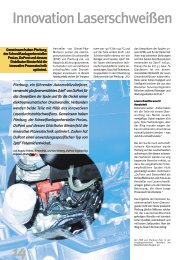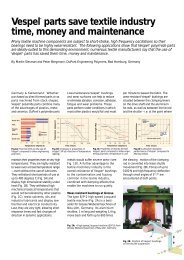General Design Principles for DuPont Engineering Polymers - Module
General Design Principles for DuPont Engineering Polymers - Module
General Design Principles for DuPont Engineering Polymers - Module
Create successful ePaper yourself
Turn your PDF publications into a flip-book with our unique Google optimized e-Paper software.
Driving Gear Meshing Gear<br />
Table 9.05<br />
Suggested Mating Material Choice <strong>for</strong> Spur Gears of Delrin ® Acetal Resin<br />
Delrin ® 500 Delrin ® 500 <strong>General</strong> purposes, reasonable loads, speed and service life, such as clock and<br />
counter mechanisms.<br />
Delrin ® 100 Delrin ® 100 Applications requiring high load, fatigue and impact resistance, such as: hand drill<br />
presses, some appliances, windshield wiper gears, washing machine drives (esp.<br />
reversing). Gears combined with ratchets, springs or couplings.<br />
Delrin ® 500 Delrin ® AF Small mechanism gear drives requiring non slip-stick behavior and less power<br />
soft metals loss (e.g., measuring instruments, miniaturized motor speed reducers). This<br />
combination does not necessarily give better per<strong>for</strong>mance as far as wear is<br />
concerned.<br />
Hardened Delrin ® 100 Excellent <strong>for</strong> high speed and load, long service life and low wear. Especially when<br />
Steel (surface used <strong>for</strong> the first reduction stage of fast running motors where the pinion is<br />
hardness machined into the motor shaft (e.g., appliances, drill presses and other electric<br />
approx. 50 Rc) hand tools).<br />
Soft steel, Delrin ® 500 CL Combined with soft metals, Delrin ® 500 CL gives considerably better results in wear<br />
non-ferrous than all other grades. In addition, it has little effect on the metal surfaces. Recommetals<br />
mended <strong>for</strong> moderate load but long service life (e.g., high quality precision gear<br />
mechanisms).<br />
Driving Gear Meshing Gear<br />
Table 9.06<br />
Suggested Mating Material Choice <strong>for</strong> Gears of Zytel ® Nylon Resin<br />
Zytel ® 101 Zytel ® 101 L Very common usage in light to moderate load applications.<br />
Hardened Zytel ® 101 L Recommended <strong>for</strong> high speed, high load applications. Best sound and shock<br />
Steel absorption. Longest wearing.<br />
Zytel ® 101 Delrin ® 100, Lowest friction and wear compared to either material running against steel<br />
500, 900 or against itself. Highly recommended <strong>for</strong> moderate duty. Best where no lube is<br />
permissible. Either material can be the driver, however, the better dimensional<br />
stability of Delrin ® acetal resin makes it the logical choice <strong>for</strong> the larger gear.<br />
rapid failure whereas under normal working conditions<br />
the gear may per<strong>for</strong>m well. Test conditions<br />
should always be chosen to come as close as possible<br />
to the real running conditions. The following examples<br />
further explain the need <strong>for</strong> meaningful enduse<br />
testing.<br />
• Gears under a high load (e.g., in appliances) which<br />
operate only intermittently should not be tested in a<br />
continuous run, but in cycles which allow the whole<br />
device to cool down to room temperature between<br />
running periods.<br />
• Infrequently operated, slow-running gears (such as<br />
window blinds) can be tested in a continuous run but<br />
at the same speed, providing temperature increase<br />
on the tooth surfaces remains negligible.<br />
59<br />
• Other applications like windshield wiper gears reach<br />
their maximum working temperature quickly, and<br />
operate most of their service life under these<br />
conditions. They should there<strong>for</strong>e be tested on a<br />
continuous-run base.<br />
Valuable conclusions can often be drawn from the<br />
static torque at which a molded gear fails. If breaking<br />
torque proves to be 8–10 times the operating load, it<br />
can usually be taken as an indication that the gear will<br />
provide a long service life in use. However, plastic<br />
gears often operate very close to the endurance limit,<br />
and the above relation should not be considered as<br />
valid in all cases.<br />
In any event, backlash must be checked during all<br />
tests. Once a gear has failed, it is almost impossible to<br />
determine whether incorrect backlash was partially or<br />
entirely responsible.



